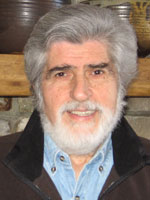Jerome Aumente Remembered; Was a Distinguished Professor Emeritus and Founder of Livingston College’s Department of Journalism and Urban Communications

With sadness, we join the Rutgers School of Communication & Information in announcing the passing of Jerome Aumente on February 13, 2023, after a long illness.
Aumente was a Distinguished Professor Emeritus in Rutgers’ School of Communication and Information (SC&I).
He was born on September 23, 1937, in Jersey City, New Jersey. He earned his undergraduate degree at Rutgers-Newark in 1959 and graduate degrees at the Columbia University School of Journalism and at Harvard University as a Nieman Fellow.
Aumente spent time in Europe and then worked for a decade at newspapers, including The Detroit News. He returned to Rutgers in 1969 to become a faculty member at Livingston College. At Livingston College, he founded and directed the Department of Journalism and Urban Communications, as well as the Urban Communications Teaching and Research Center.
He was the founding Director of the Journalism Resources Institute (JRI) and was the founder and former Chairperson of the Department of Journalism and Media Studies. Both units are in the School of Communication and Information, one of the first interdisciplinary schools founded in the United States, which he helped design at the request of the university provost.
He was Special Counselor to the Dean of SC&I from 2000 to 2015. The Journalism Resources Institute conducted nearly $5 million in projects, and trained over 14,000 print and broadcast journalists under his direction, with over $2 million in media training and journalism projects in Central and Eastern Europe. The JRI under Aumente’s leadership had special projects in international affairs, journalism. and mass communications, new media technologies, health, medical, and environmental coverage, media and law, evaluation of professional training of journalists, business, and financial journalism.
Aumente had extensive experience in the international training of journalists; joint curriculum development with universities internationally and in the United States; as a trainer in health communication, the internet and newer media technologies; investigative and enterprise reporting; and in business, economic, and financial reporting.
In 2011, the Livingston Alumni Association (LAA) honored Aumente with its Livingston Legacy Award. The award recognizes faculty and staff who played a key role in the establishment and growth of Livingston College and its mission, and who have contributed to the overall Rutgers and global communities.